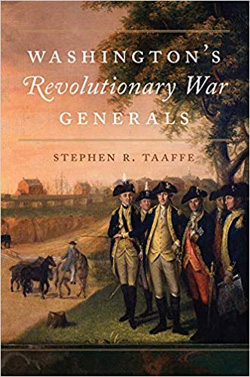Ohio University alumnus Dr. Stephen R. Taaffe has written his seventh book, Washington’s Revolutionary War Generals, published by the University of Oklahoma Press and available on Amazon and other booksellers.
Taaffe is Professor of History at Stephen F. Austin State University in Nacogdoches, Texas.
He earned an M.A. in Latin American Studies in 1991, a Certificate in Contemporary History, and a Ph.D. in History in 1995 from the College of Arts & Sciences at Ohio University. He graduated from Grove City College with a B.A. in political science.
 His other books include MacArthur’s Korean War Generals (2016); Marshall and His Generals: US Army Commanders in World War II (2011); Commanding Lincoln’s Navy: Union Naval Leadership During the Civil War (2009); Commanding the Army of the Potomac (2006); The Philadelphia Campaign, 1777-1778 (2003); MacArthur’s Jungle War: The 1944 New Guinea Campaign (1998).
His other books include MacArthur’s Korean War Generals (2016); Marshall and His Generals: US Army Commanders in World War II (2011); Commanding Lincoln’s Navy: Union Naval Leadership During the Civil War (2009); Commanding the Army of the Potomac (2006); The Philadelphia Campaign, 1777-1778 (2003); MacArthur’s Jungle War: The 1944 New Guinea Campaign (1998).
This week Professor Taaffe was kind enough to give an interview with CHI about his latest book, writing history, and advice on entering the historical profession.
Could you start by telling us about your most recent book and how you became interested in the topic?
Washington’s Revolutionary War Generals examines the selection and performance of the seventy-three generals Congress chose to lead and manage its armies. The thesis is that the quality of these generals was on the whole rather poor for a variety of reasons – inexperience, culture, intercolonial bickering, etc. – but Congress found enough good ones to provide the margin between victory and defeat.
My specialty is American military leadership. I’ve looked at American military leadership in the Civil War, World War Two, and the Korean War. I wrote about a Revolutionary War campaign in my second book, so I had some experience in the subject area. I figured it was a doable topic that wouldn’t require a lot of traveling to archives.
Washington’s Revolutionary War Generals is your seventh book on American military leadership. What are some of the major challenges and achievements you have encountered with your different books?
For me that biggest challenge isn’t writing the manuscript – that’s usually just a matter of time and self-discipline, two things over which I have some control. The big challenge is getting someone to publish it. Although military history sells, most academic presses want nothing to do with it. Commercial presses, for their part, are reluctant to publish military history that is too academic. Also, sometimes reviewers are kind and helpful, and getting the manuscript through the review process can be easy. Other times, though, reviewers are neither kind nor helpful, and make criticisms that are hard to understand, let alone address. One reviewer, for example, once called my work an embarrassment to the profession. Maybe that’s true, but it’s hard to respond to that.
Nevertheless, you have been very successful in getting your books published. Do you have any advice for young scholars entering the publishing market for the first time?
My advice:
- Write on something that will interest the average educated person.
- Use the narrative to tell a story. Make your points within the narrative framework.
- Avoid jargon and theory like the plague. Every time you use words such as “discursive,” “heteronormative,” and “heuristic,” I’m pretty sure a truck runs over an angel.
From the books you have written, what qualities or abilities makes a successful American general?
As far as I can tell, the one thing that all good generals have in common is what the British in World War Two called “grip.” By that they meant the ability to understand situations, choose good people, devise a clear and simple solutions, and ruthlessly implement plans. Good advice for any profession, really.
How do you balance your teaching and writing?
I sacrificed historiography a long time ago. Sure, I can tell you the latest books in whatever field I’m currently researching, but that’s about it.
How did your experience at the Contemporary History Institute help get you established in your current profession?
Looking back, there is one thing that sticks in my mind. Dr. John Lewis Gaddis told a class that we should try to write in an interesting manner. Boring is the worst sin a writer can commit.
Any advice for academics getting ready to enter the job market?
- Make sure you have experience teaching your own class.
- Try to have an unusual secondary or tertiary field. If you can teach, say, African history or history of science and technology, that will make you more appealing to a search committee.
- Try to publish something. I don’t believe in publish or perish, but it’s a fact of life at many schools. Having something published – doesn’t matter how prestigious the journal or press is – puts candidates at the top of the pile because it shows that they have the wherewithal to do it.
- During interviews, talk. I’m amazed at the number of candidates who during on-campus interviews act like bumps on a log, and respond only to questions asked of them. Ask questions about the university, the town, the program, etc. Ask about other professors’ research interests, family, hobbies. Talk about your own life – hobbies, children, spouses. Talk about anything except politics and religion. Search committees are looking for good colleagues, not automatons.
What are your future book plans?
I’m currently working on a manuscript on Marine Corps combat commanders in World War II.



















Comments